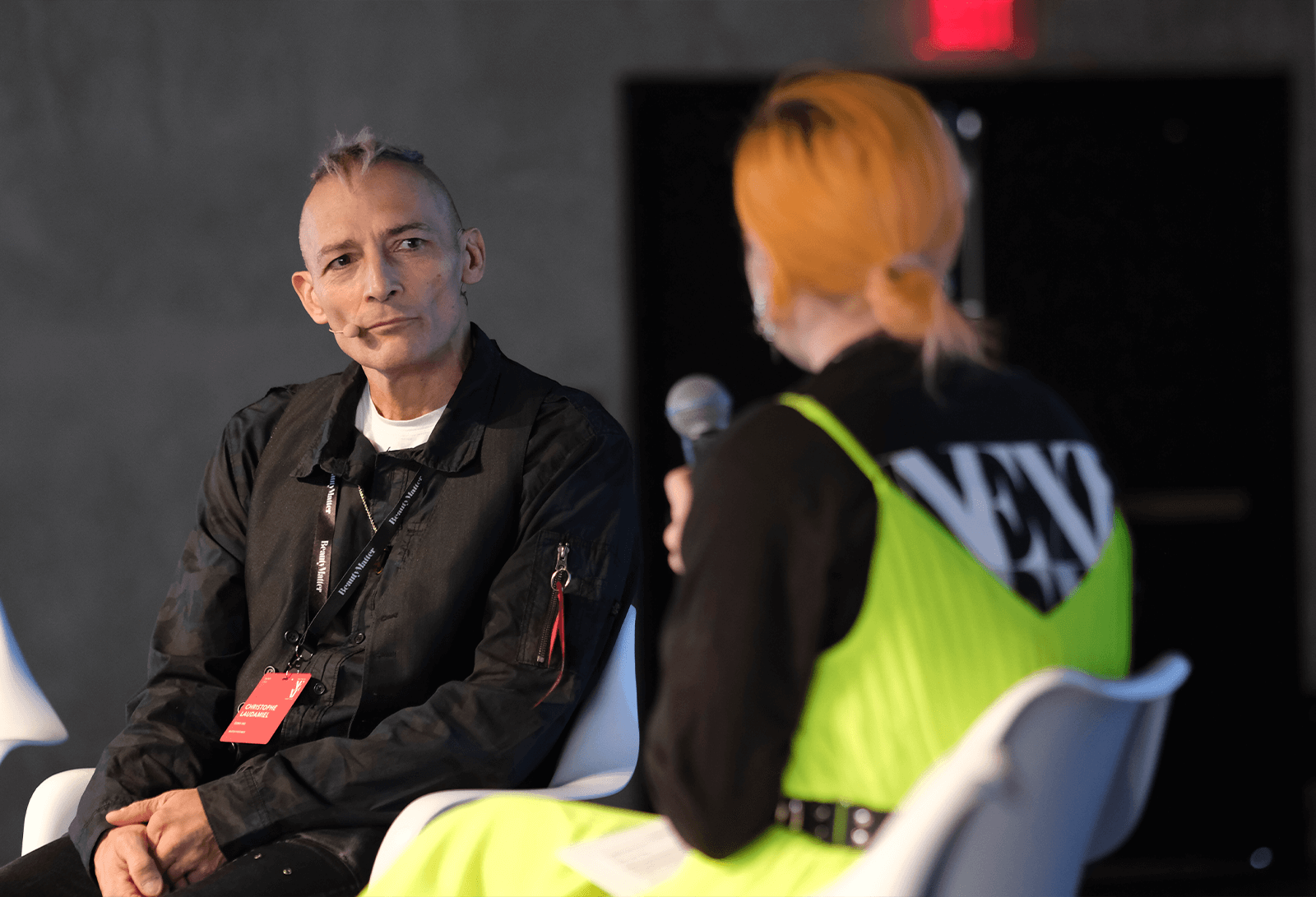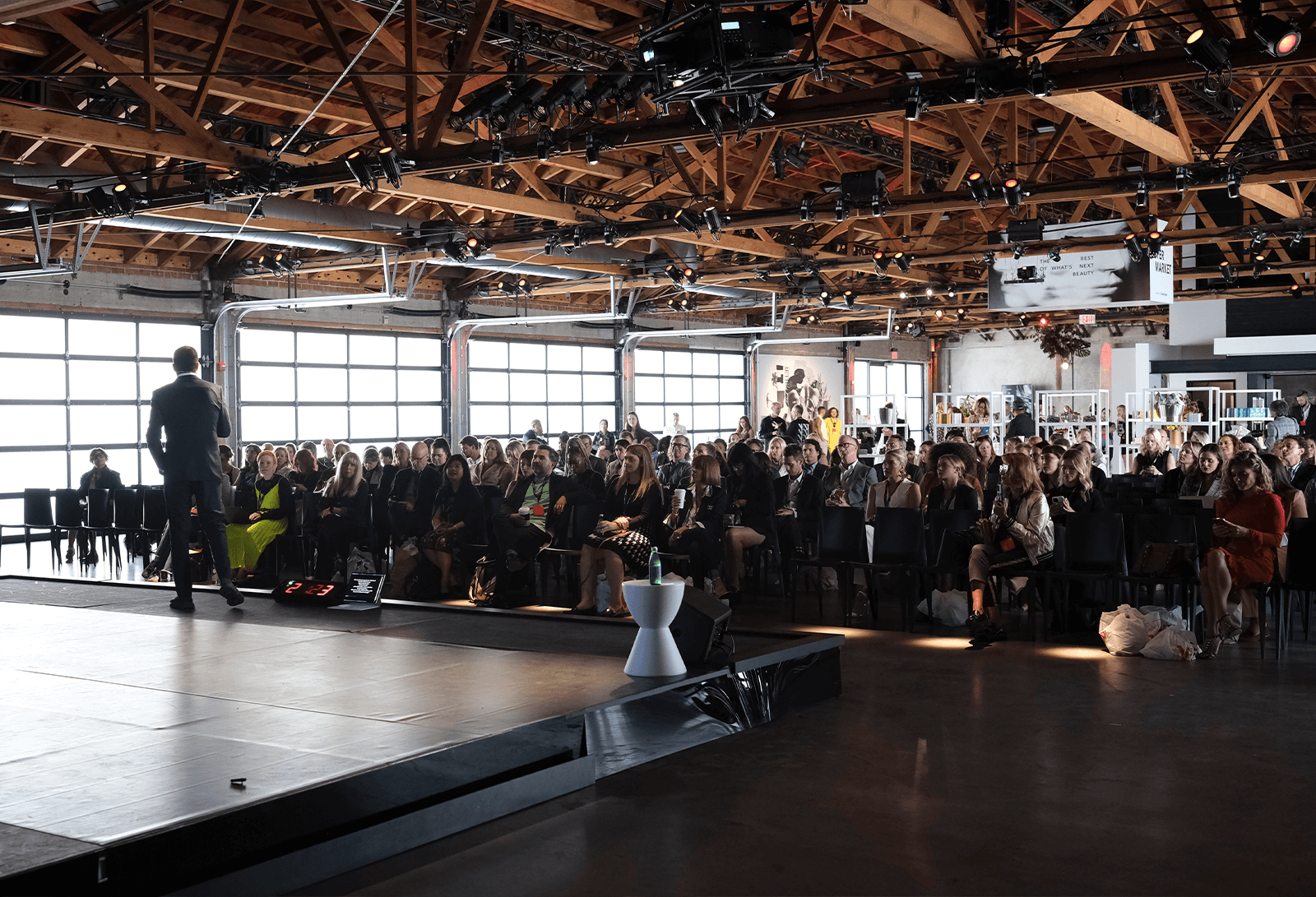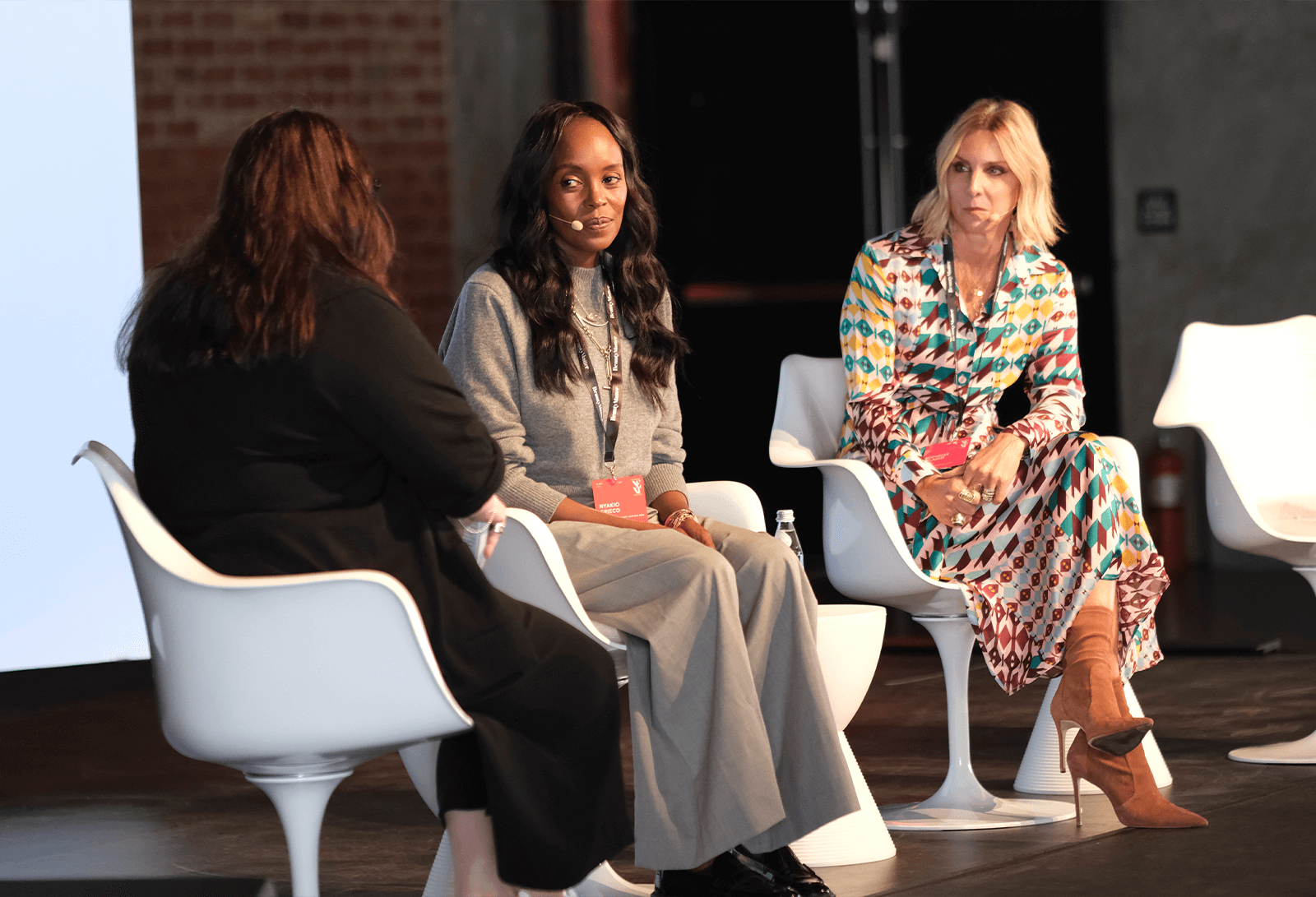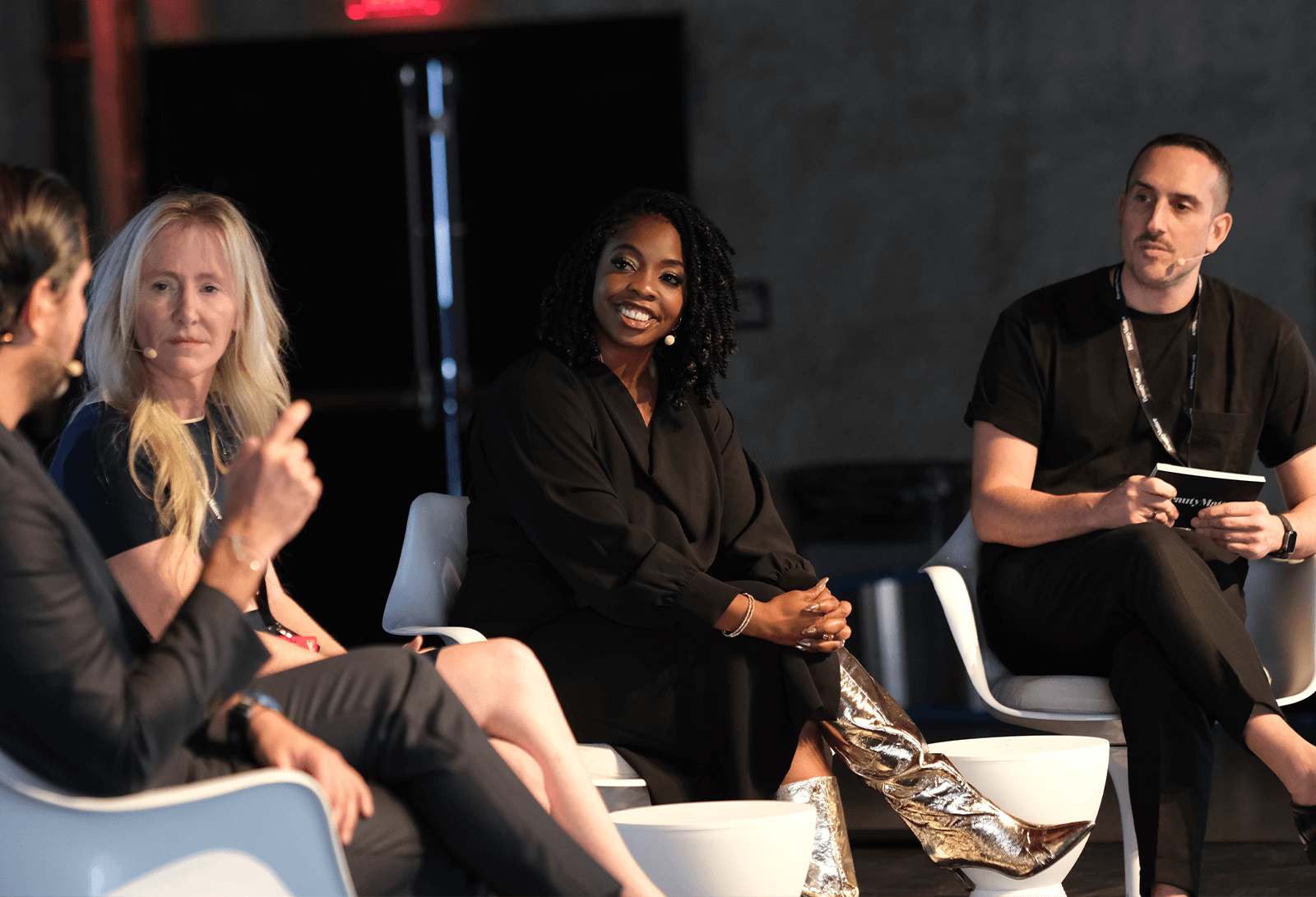"Community is at the heart of what we do,” BeautyMatter founder Kelly Kovack declared during the opening remarks of the BeautyMatter NEXT Summit 2023 in Los Angeles. The keynotes, fireside chats, panel discussions, and networking opportunities that followed certainly stood up to that declaration.
The winners in the Visionaries category—Entrepreneur of the Year Suveen Sahib of K18, Innovator of the Year Candace Victoria Harris of Myavana, and Changemaker of the Year Edwin Neill of Neill Companies—all have built booming businesses through building networks of professionals and consumers alike. Person of the Year winner, Carol Hamilton, Group President of Acquisitions for L'Oréal USA—recognized by Kovack and BeautyMatter President John Cafarelli for her “continuing theme of mentorship and kindness” and “the path that she has created being a leader when there was not a lot of female leaders”—also praised the power of uniting the beauty community.
“I treasure this honor more than any other because it is about the founder community; a community that inspires me every day. You are all building the future of beauty, and all of you have more courage than I could muster. I’ve seen a kindness, a generosity, a support system that is so remarkable. This ecosystem of support is one of the key reasons we see this growth [in our industry],” Hamilton declared to the audience while reflecting on her five decades in the industry. “Keep it simple, stand for something, always have a plan, do not delay,” she advised the aspiring entrepreneurs in the audience.


Thought-Provoking Discussions
Building a beauty network does not come without its challenges. The NEXT Summit panel discussions weren’t afraid of addressing those challenges. The day’s discussions kicked off with Charlotte Watson, Olaplex Chief Marketing Officer (CMO), talking about the brand taking back its power from dupe culture with the Oladupé campaign, and protecting the brand’s intellectual property against counterfeits through technological advancements and cross-department efforts. “We dupe the dupers,” Watson proclaimed, giving brand owners valuable advice for the future. “Don’t wait until you are impacted by dupe and counterfeit culture because it’s not going anywhere,” she advised.
Christophe Laudamiel, Master Perfumer at Osmo, spoke to the difficulties of creative copyright protection in the fragrance industry. “We are working with a broken system,” he acknowledged to BeautyMatter Editor Carla Seipp, speaking about the ease of copying fragrances through gas chromatography analysis and low-cost/easily accessible ingredients. While trends are a natural part of the industry and many brands want to capitalize on the popularity of certain hero products, Laudamiel appealed for better legal protection of the original creations. “If you are duping another creation, acknowledge the perfumer who inspired your creation and give them a cut of the product sales. Recognize perfumers as artists,” he stated.
Moj Mahdara, Managing Partner at Kinship Ventures, spoke to the strength in personalizing your failures. “The majority of great founders have had the most failures. We have to flip the script and talk about it. I think it’s a lot easier to give advice when you have been on the other side of it,” she told Kovack, while Daniel André Langer, Chief Executive Officer (CEO) at Équité, stated, “Without cultural capital you are dead as a brand.” Langer, who spoke to the challenge of capturing a Gen Z audience, posed the following questions to brand owners in a bid to claim their stake with this valuable consumer crowd: What do you really sell? What emotion do you want to invoke? How does your audience view you differently?
Don Frey, President and CEO of the Independent Beauty Association, gave the audience a different set of questions to ponder, namely to accommodate cosmetic facility registration and adverse event tracking for the fast-approaching deadline of December 29, 2023. Frey also warned entrepreneurs of the impact of Extended Producer Responsibilities (EPR) present in th California and Colorado, which requires a state recycling payment from brands producing products with single-use plastic.


Finding and Harnessing the Strength of Your Tribe
Building, maintaining, and growing an audience were further key talking points of the day. Fresh off the launch of TikTok Shop, TikTok Shop’s Head of Beauty Ajay Salpekar was joined by Dieux Skin Chief Operating Officer Kristine Linnea Camarlinghi and Iced Media CEO and founder Leslie Ann Hall to help brands navigate this new frontier of social commerce that capitalizes on the immense pull of TikTok virality. “TikTok Shop allows you to go from awareness to conversion in 30 seconds,” Salpekar said of the commercial opportunity. “The first thing for brands to understand is that it requires a mindset shift, combing brands and marketing in a way that we’ve never seen. It's absolutely revolutionizing the beauty industry in terms of creating an equal playing field for brands. Our clients need to throw away their influencer playbook,” Hall added, citing a statistic that saw micro influencers outperform household names in a ratio of 5:1 when it comes to driving sales. As one of the first brands to experiment with the medium, Dieux Skin proved to be a valuable case study, with Camarlinghi mentioning the company had to completely shift and adapt their strategy to TikTok Shop. “We were able to write the playbook that we weren’t able to write before. We learned our audiences’ behaviors; we learned about the platform itself,” she recounts.
On the subject of customer acquisition, uncharted retail territories are proving vital. Michelle Wlazlo, Executive Vice President and Chief Merchandising Officer at JCPenney and Nyakio Grieco, co-founder of Thirteen Lune and founder of Relevant: Your Skin Seen, talked about their partnership that provides a path-to-scale for emerging brands and creating a new rule playbook when it comes to authentic inclusivity in the beauty retail experience. Wlazlo spoke about how important it is “to have everyone feel they are valued” at the 122-year-old-retailer, which defines itself as built “into the fabric of America. "Part of that picture is having an incredible range of access with 680 beauty stores and 640 full-service salons nationwide. Grieco touched on an emotional and personal anecdote of her own mother shopping at JCPenney when the founder was a child because of the expansive makeup shade range the retailer offered. Fast forward to today, and in partnership with JCPenney, Grieco wants to usher in a new era for Black and Brown beauty brands, with the JCPenney x Thirteen Lune mentorship and scaling program providing a crucial stepping stone. “We knew the customer was there. We also want to debunk the myth that Black and Brown people only make products for themselves. We make products for everyone and for the brands we support; we’re there in the hard times and there in the great times,” she says.
While often misunderstood, the professional channel is a powerful brand building tool—as Suveen Sahib, CEO of K18; Carrie Gross, CEO of Dr. Dennis Gross Skincare; and Richard Parker, founder of Rationale can attest. “The credibility is so valuable; the spa channel is like the jewel in our crown,” Gross comments. “We help our spa clientele create customer loyalty. It’s not just about building a relationship but building the business together.” Investing in the education of that clientele is equally important. “There is nothing passive about selling in a doctor's office. There is a huge investment in time and resources and training,” Parker adds. He describes Rationale as “not a skincare company, but a research company that makes skincare,” making its science focus a perfect fit for doctors’ offices. Sahib sees professional distribution as fusing the brand DNA with each professional’s future success. “It’s not just about the salon space; it’s about owning the mind space of the professional. How do you nurture them? How do you inspire them?” he asks.
Inspiration was at the top of the list when MAC Cosmetics was set up in 1984 by Frank Angelo and Frank Toskan, but its professional artistry focus also came with a foundation of activism—namely in the form of MAC Viva Glam AIDS fund, which has raised over $500 million annually to date. André Branch, Senior Vice President and General Manager of the brand, unpacked the importance of maintaining the brand’s groundbreaking heritage while also keeping it relevant for Gen Z audiences, thanks to an immersive, popular culture approach to brand building. “MAC Cosmetics is grounded in the idea of community, makeup artistry, and wanting to help people. All those things were relevant 40 years ago, but I would say they are even more relevant today. One of the critical ingredients to our success is the extraordinary zeal of the brand. The X factor for any brand’s success or failure is the team,” Branch states. Making its social media strategy “a local conversation not a global conversation,” curating the brand’s digital footprint and tapping into Gen Z’s affinity for nostalgia, in “a mix of math and magic,” are also proving successful.
Social media success was also a key talking point for Brad Farrell, CMO at Beekman 1802 and Emily MacKinnon, Senior Strategic Account Manager at Dash Hudson, when describing the new ecosystem of strategy where creators, content, and commerce collide. The definitions of creator ROI have shifted from follower number-driven to engagement-driven strategies. “There's been a gigantic shift across the social landscape away from those beautiful, polished, expensive ads to entertaining content shot on an iPhone. That's what people want to see. When people sniff out an authentic creator, regardless of how large they are, their engagement rate skyrockets. We typically see a 16x higher engagement rate with creators versus brands themselves,” she comments. Beekman 1802 has seen engagement skyrocket with its own cross-category partnerships with the likes of Mrs. Potato Head and Jiffy Lube. “Creativity has to come with the data. You want to get high engagement that can lead to conversion, which can lead to good ROI, but if you don't have a big idea up there, it's not going to create that,” Farrell adds.


The Future of Investments
“The competitive landscape requires a big budget to compete. Twenty five years ago you could self-fund and launch in Barneys. Today that’s not possible,” Kovack remarked earlier in the day—so naturally audience members were eager to learn the latest news in the investment landscape from Deborah Benton, Managing Partner and founder at Willow Growth Partners; Jorge Cosano, founder and Managing Partner at Synchronicity Ventures; and Kendra Bracken-Ferguson, founder and CEO of BrainTrust. Skincare was one of the most active categories but saw 24 brand failures in Q3, leading to mixed messaging growth stories.
“There is not one white space; there are many white spaces: innovations around materials and formulations, retail channels, content innovation. What’s most important for founders is find your white space. Gone are the days where you can white label a formulation and put a beautiful brand on it and bring it to market,” Benton proclaimed, also noting that she is seeing a “healthy culling” but that 2024 could bring a turnaround. “You will win if you find the niche or the desire and create the products to satisfy that,” Cosano advised entrepreneurs. “Look at some of the winning companies; those came from the last economic crisis. A lot of people were attracted to the business for the wrong reasons, and now it is a time of correction. The market is tough, but for the right founders and good ideas there is always opportunity.” BrainTrust invests in Black-owned beauty, which has been notoriously underfunded despite the substantial spending power of its consumers. “It wasn’t a case of this is the right thing to do, this is good business,” Ferguson notes. “We spend so much time educating investors about the communities we are serving. There is room for all of us to create brands.” All three panelists advised against putting too much emphasis on valuations, which were termed “a completely fabricated number” and instead to “buckle down and be super judicious with your capital.” Women’s hormonal health, functional color, scalp care, AI-led beauty, and ingestible wellness were highlighted as prime categories for investment.
Another area with potential for growth is the new iteration of the metaverse, or web 2.5 (a connection of the digital with the physical to facilitate community and drive sales) as it was termed in conversation with Maya Kosovalic, Vice President of Digital Innovation at NYX Professional Makeup; Agustina Sartori, Senior Director of Digital Innovation at Ulta Beauty; and Bridey-Rae Lipscombe, co-founder and CEO of CULT. “You need to be where the consumer is. There are already established platforms; now it’s a question of finding those spaces for engagement,” Kosovalic commented. “We’re always looking for new channels. Technology is part of the future of beauty, but adoption is still to come. Understanding what it is that you want to learn is key. Be thoughtful about what your choices are, or you can get lost in creating your own metaverse,” Sartori added. According to Lipscombe, “The metaverse represents an investable evolution of the online experience, but we are not there yet. There are big audiences in meta-gaming and Gen Zalpha coming through. See it as part of 360-degree environment, enabling self expression.”
Creating those “tribal audiences,” as Mahdara calls them, is a key to brand strategy. “Trends take three to five years to hit mass market, and having a mass brand is really hard right now. The number one thing I am looking at when working with a brand is how close they are to their tribal audience. Their consumers are actually their stakeholders,” she says. “You cannot buy consumers and audiences. We tried, and the market kicked us in the shins. In the end, when you look at acquisitions, it is ultimately brands who build a strong, intense relationship with their stakeholders, listen to what they want, and show up for when they have feedback.”
The final panel of the day—consisting of Sophie Bai, founder of B.A.I. Biosciences, Inc. and Pavise; Carolina Reis, founder of OneSkin; and Dr. Robb Akridge, founder of Opulus Beauty Labs—looked to the future of investment in science as the new driving force of skincare. Where clean beauty primed audiences for medical study curiosity and ingredient scrutiny, this new era is based in medical backing and years of dedicated research to create truly unique products. While all three admitted the challenges of funding an innovation-driven brand built entirely new from the ground up, the promising potential of shifting the skincare industry into a new era of efficacy and ingredient transparency is more than worth the effort. From inventing proprietary peptides that target anti-aging at the cellular level to superhero zinc oxide filters for superior sun protection and delivery components that offer an adjustable daily dose of efficacious actives, the sky is the limit.
“The industry needs a huge revamp in terms of what's available in raw materials that are efficacious and therapeutic,” Bai comments, adding that “skincare is healthcare.” “When you invent something that's totally different, it's all about education; one of the challenges we're encountering is how to educate consumers,” Akridge admits, although all three founders stand by the power of innovation. “If you want to build a company that's going to last decades, 100 years, this is totally worth the investment, because if you continue to have innovation, pushing forward the development of products, you are going to make sure that you are ahead of the market. Given that it's such a saturated market, if you don't have something that's really differentiated and based on solid science, it's going to be hard staying in the business long term,” Reis adds.
The day concluded with the NEXT Awards ceremony, highlighting the entrepreneurs, branding and marketing agencies, creatives, brands, and PRs who pushed the boundaries of beauty in 2023, acknowledging the talents shaping the industry’s present state and future. Learn more about the winners here.